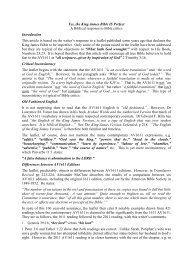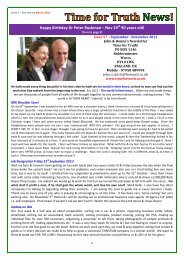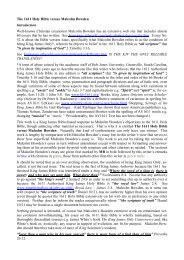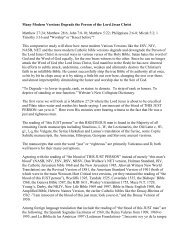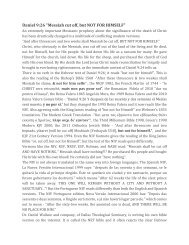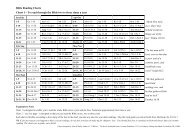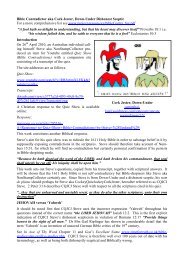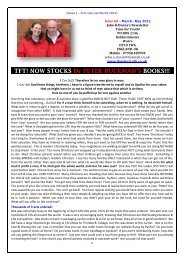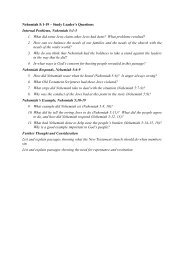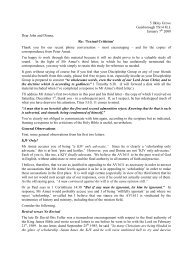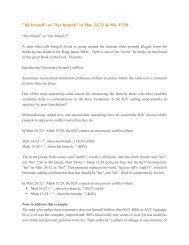A Grievous Wolf - Time for Truth
A Grievous Wolf - Time for Truth
A Grievous Wolf - Time for Truth
Create successful ePaper yourself
Turn your PDF publications into a flip-book with our unique Google optimized e-Paper software.
45<br />
If he is saved, <strong>Grievous</strong> <strong>Wolf</strong> stands to reap the ashes of “wood, hay, stubble” 1 Corinthians 3:12, 13 at<br />
“the judgment seat of Christ” Romans 14:10, according to Proverbs 13:13. <strong>Wolf</strong> should be thankful he<br />
doesn’t live in Old Testament times in that only his works will burn up, not his person.<br />
“Whoso despiseth the word shall be destroyed: but he that feareth the commandment shall be rewarded.”<br />
<strong>Grievous</strong> <strong>Wolf</strong> also fails to appreciate that God can edit His Book in just the same way that any human<br />
author can. See Dr Ruckman’s comments in the Ruckman Reference Bible p 1238 with respect to Matthew<br />
2:18, which is one of numerous New Testament quotations from the Old Testament that don’t precisely<br />
match their Old Testament counterparts. Note also Jeremiah 36:32.<br />
“Then took Jeremiah another roll, and gave it to Baruch the scribe, the son of Neriah; who wrote<br />
therein from the mouth of Jeremiah all the words of the book which Jehoiakim king of Judah had<br />
burned in the fire: and there were added besides unto them many like words.”<br />
41. Did the great Protestant Re<strong>for</strong>mation (1517-1603) take place without “the word of God” since the KJV<br />
was not in existence? Did Martin Luther need the KJV to get a revelation of grace salvation and that<br />
the Papacy was in error on at least 95 doctrinal points?<br />
See Questions 28, 30, with respect to the purification process of Psalm 12:6, 7 that <strong>Grievous</strong> <strong>Wolf</strong> still<br />
doesn’t understand.<br />
42. What copy or translations of “the Word of God,” used by the Re<strong>for</strong>mers, was absolutely the infallible<br />
and inerrant Word? [their main Bibles are well-known and copies still exist but they are not the KJV].<br />
See Questions 28, 30, with respect to the purification process of Psalm 12:6, 7 that <strong>Grievous</strong> <strong>Wolf</strong> still<br />
doesn’t understand.<br />
43. If the KJV is “God’s only infallible and preserved word to the English-speaking people,” did the “English-speaking<br />
people” have “the word of God” at all in the other English versions be<strong>for</strong>e 1611?<br />
See Questions 28, 30, with respect to the purification process of Psalm 12:6, 7 that <strong>Grievous</strong> <strong>Wolf</strong> still<br />
doesn’t understand.<br />
Dr Mrs Riplinger states that the Bible translators of the English Re<strong>for</strong>mation “described their vernacular<br />
translations as “scripture,” whose author was God.” She adds that “Martyr and Archbishop<br />
Thomas Cranmer, wrote in his Prologue to the Great Bible that it was “given” by the “holy spirit.””<br />
See In Awe of Thy Word pp 757-759, 805, 846-847.<br />
Cranmer (martyred), Tyndale (martyred), Coverdale, Rogers (martyred) and the other Bible translators<br />
of the English Re<strong>for</strong>mation, plus Wycliffe be<strong>for</strong>e them believed that they had in their hands “all scripture...given<br />
by inspiration of God” in English. In contrast to the apostates described in Romans 1:18,<br />
like <strong>Grievous</strong> <strong>Wolf</strong>, they believed that they held the truth in righteousness. This inspired English scripture<br />
reached its final purified stage with the Holy Bible of 1611, Psalm 12:6, 7, thereby superseding in<br />
both inspiration and authority the earlier English versions. See also Hazardous Materials, pp 1165-<br />
1167.<br />
44. Were the English versions of Tyndale’s [1525], or Coverdale’s [1535], or Matthew’s [1537], or the<br />
Great [1539], or the Geneva [1560], absolutely infallible? Would God not inspire them to be error free<br />
as well as with the KJV or does God pick and choose which version he will preserve and “allow” the<br />
others to have errors?<br />
See Questions 28, 30, with respect to the purification process of Psalm 12:6, 7 that <strong>Grievous</strong> <strong>Wolf</strong> still<br />
doesn’t understand. See additional remarks under Questions 43.<br />
45. If neither the KJV nor any other one version were absolutely 100% without error, could a lost sinner<br />
still find salvation and be “born again” by the “incorruptible word of God” [Acts 2:38, 1 Peter 1:23]?<br />
The answer is YES!<br />
So why bother asking the question?



